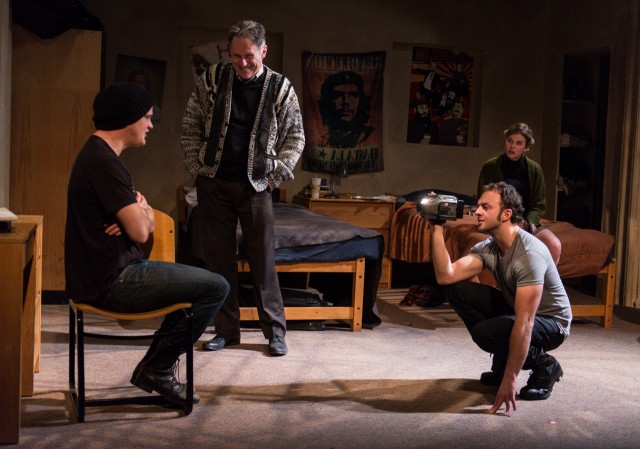
The Amoralists explore manipulation, vulnerability, power, and control in COLLISION (photo by Russ Rowland))
Rattlestick Playwrights Theater
224 Waverly Pl.
Through February 17, $55
www.theamoralists.com
www.rattlestick.org
In such recent works as The Bad and the Better and HotelMotel, the New York–based Amoralists theater company challenged audiences with its unique take on story, staging, and setting; the former featured more than two dozen actors onstage at any one given time, effortlessly weaving between multiple scenes, while the latter took place in a hotel room where the crowd of twenty people sat either around a bed or within the set itself. Its latest production, the world premiere of Lyle Kessler’s Collision, is a more staid affair, both in design and execution. The play is set in a college dorm room as Grange (Amoralists cofounder and artistic director James Kautz) and Bromley (Nick Lawson) meet. It is instantly clear that Grange, who puts up posters of Che Guevara, Malcolm X, and Kurt Cobain as well as a photo collage of “a cross-section of humanity . . . No one of any consequence,” is adept at making people do whatever he wants, even if it goes against their own ethics and morals, manipulating them in devilishly clever ways that gets deep into their inner being. He exerts his power over Do (Anna Stromberg), an innocent coed who both Grange and Bromley are attracted to, in addition to one of his teachers, Professor Denton (Michael Cullen), who refuses to call on him in class. As the four grow closer, Grange takes advantage of their individual vulnerabilities on his way to a finale that is meant to be shocking but instead comes off as overly sensationalistic and even disappointing in its obviousness. “One man’s rose is another man’s Holocaust,” Grange tells Bromley early on. The five-person cast, which also includes Craig ‘muMs’ Grant (Oz) as a gun dealer, performs solidly throughout; Cullen (Cobb, Bug) is particularly effective as the older man looking to make one last stand. Much of the narrative relies on Kautz’s (Dedalus Lounge) ability to not only convince the other characters of his superiority but the audience as well, and he does so with a smooth determination. David Fofi’s unexciting direction doesn’t add anything to Kessler’s words, which too often toy with clichés in what amounts to clichéd ways. Collision was undergoing significant changes up to the last minute, when the ending was altered and the play morphed from a black comedy to a straight drama, and that lack of definition shows in far-too-many unsteady moments that result in the show falling somewhere in between, relying on too many leaps of faith on the part of the characters and the audience. Collision continues at the Rattlestick Playwrights Theater through February 17; Kessler’s 1983 hit, Orphans, will be making its Broadway debut in April, starring Shia LeBouf and Alec Baldwin.